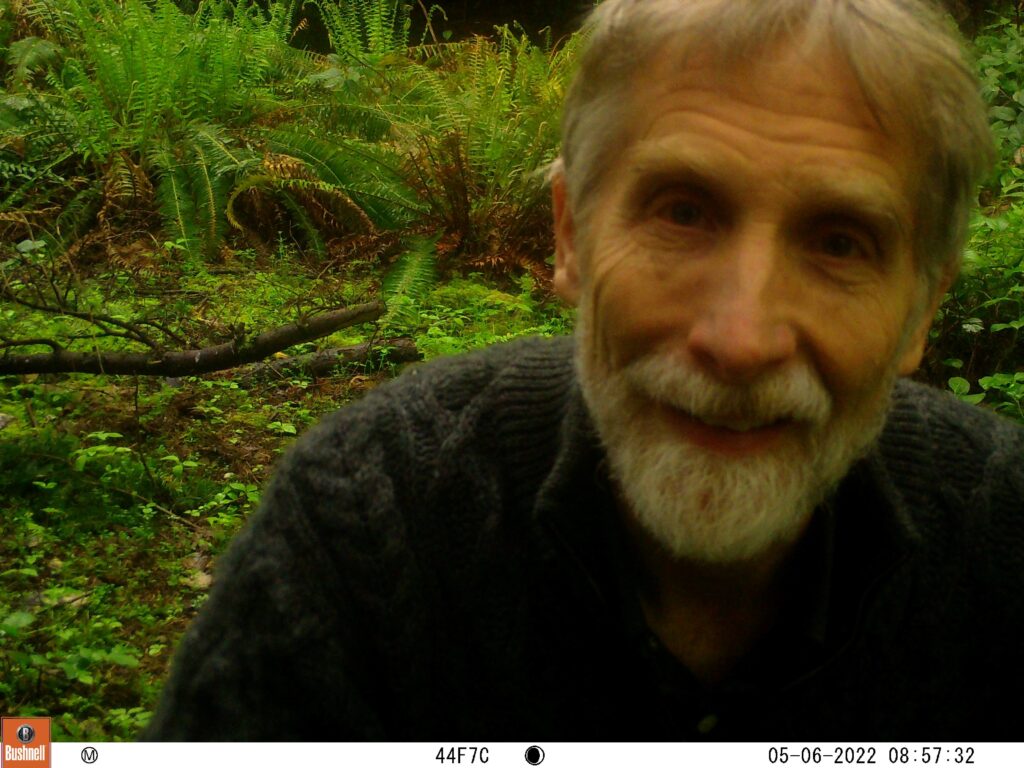David Stokes
Emeritus Professor

B.A. Geology, Williams College
Ph.D. Zoology, University of Washington
Email: dstokes@uw.edu
Mailing Box: 358530, 18115 Campus Way NE, Bothell, WA 98011-8246
Teaching
As of 2024, I have transitioned to Emeritus Professor status and no longer teach classes. However, I continue to conduct research (see below) in conservation biology, ecology, and urban ecology, and am happy to advise students with research interests and capstone projects in these areas.
Research/Scholarship
My research addresses topics in the fields of conservation biology, behavioral ecology, urban ecology, and landscape ecology, with the ultimate purpose of developing the understanding necessary for more harmonious and equitable co-existence of humans with our natural environment and the other species with which we share that environment.
Currently, my primary research focus is on the role of urbanized landscapes in supporting native species. Since 2018, my students and I have been using wildlife camera traps and other techniques to investigate the presence and activity of native mammal species in parks and green spaces in the urbanized Northshore region of the Seattle metropolitan area. We have found a surprising level of mammal diversity, including a robust mesopredator community, as well as high diversity of native birds and plant species. In 2021 I expanded this project to include investigation of wildlife outside of parks and green spaces with a citizen science project in which members of the community manage wildlife cameras to monitor wildlife in the neighborhoods where they live. Through all of this work we are trying to learn how native species use urban habitats, what makes good habitat for urban wildlife, what aspects of urbanization are most threatening to wildlife persistence, and how we might design or manage the areas where we live to better accommodate the needs of native species. This work has implications not only for conservation of species, but quality of life and environmental equity for humans.
I am also pursuing research on the ecology and conservation of an endangered salamander species that inhabits a rapidly urbanizing area of California, and the ecological impacts and patterns of spread of non-native invasive tree species in Pacific Northwest forests. Additional research interests include topics in behavioral ecology such as habitat selection and migratory behavior in penguins, land-use planning and biodiversity conservation, human biodiversity preferences, the relationship between urban biodiversity conservation and human environmental equity, and the role of the concept of the wild and wildness in conservation. Much of my research is field-oriented and is associated with UW Bothell’s Collaborative for Socio-Ecological Engagement CoSEE based at St. Edward State Park. I welcome participation by students in all my research.
Selected Publications
- Stokes, D.L., Messerman, A.F., Cook, D.G., Stemle, L., Meisler, J.A., and C.A. Searcy. 2021. Saving all the pieces: an inadequate conservation strategy for an endangered amphibian in an urbanizing area. Biological Conservation 262 (2021) 109320.
- Stokes, D.L. 2018. Why conserving species in the wild still matters. Biodiversity and Conservation 27:1539–1544.
- Stokes, D.L., Church, E.D., Cronkright, D.M., and S. Lopez. 2014. Pictures of an invasion: English Holly (Ilex aquifolium) invasion of a Pacific Northwest forest. Northwest Science 88:75-93.
- Stokes, D.L., Boersma, P. D., Lopez de Casenave, J., and P. García-Borboroglu. 2014. Long-distance migration of Magellanic penguins requires marine zoning for conservation. Biological Conservation 170:161-171.
- Stokes, D.L., Hansen, M.F., Oaks, D.D., Straub, J.E., and A.V. Ponio. 2010. Biodiversity conservation in local land-use planning: what planners can tell us about what works. Conservation Biology 24:450-560.
- Stokes, D.L. 2007. Things we like: Human preferences among similar organisms and implications for conservation. Human Ecology 35: 361-369.
- Stokes, D. L. 2006. Conservators of experience. BioScience 56: 6-7.
- Stokes, D.L., and P.H. Morrison. 2003. GIS-based conservation planning: a powerful tool… to be used with care. Conservation in Practice 4: 38-41.
- Stokes, D.L., and P.D. Boersma. 2000. Nesting density and reproductive success of a colonial seabird. Ecology 81: 2878-2891.
